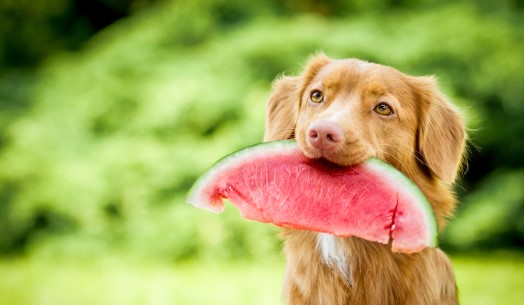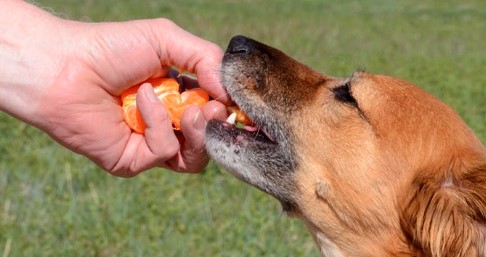Yes, Dogs can eat watermelon rind, but it should be given in moderation due to its potential to cause digestive issues.
Watermelon is a refreshing fruit that many humans enjoy during hot summer days, and it’s natural to wonder if dogs can also indulge in this juicy treat.
While dogs can safely eat watermelon, they should consume it in moderation, especially regarding the rind. The rind is the outer green layer of the fruit, and while it’s not toxic to dogs, it can be difficult for them to digest.
Table of Contents
Can Dogs Eat Watermelon Rind Safely?
The answer is yes; dogs can eat small amounts of watermelon rind in moderation. A few bites of the pink inner rind will provide fiber, nutrients, and dental benefits without causing issues.
Key tips are to introduce slowly, monitor your dog, cut rinds into tiny pieces to reduce choking and blockage risks, wash thoroughly, and avoid letting your dog eat too much at once.
While the juicy red flesh is healthier and tastier, the rind should be fine if fed properly in small quantities. Feeding too much rind can lead to obstruction, diarrhea, vomiting, gas, and choking. But the amount of rind that poses a real risk is far more than what most dog owners would ever feed their pets.
Nutritional Value of Watermelon Rind for Dogs
Watermelon rinds are safe for dogs and can even provide some health benefits. They are low in calories and fat, making them a healthy option for dogs on a weight management diet. Watermelon rinds have small amounts of:
- Dietary fiber for digestive regularity
- Vitamin C for immune health
- Citrulline to help reduce muscle fatigue
- Vitamin B6 to support metabolism and nerve functioning
- Magnesium for bone, enzyme, and muscle health
However, a dog’s digestive system is different from a human’s. Dogs have shorter digestive tracts, so they may have difficulty breaking down certain foods. They also lack the enzymes to digest plant material like watermelon rind fully.
Potential Benefits for Dogs
While watermelon rind may not be as tasty or nutrient-dense as the juicy red interior, it does offer some potential digestive and dental benefits for dogs.
Some possible benefits of feeding small amounts of watermelon rind to dogs include:
Digestive Regularizer
The rind contains dietary fiber like citrulline and small amounts of vitamins and minerals. Thanks to its fiber content, it can aid healthy digestion and possibly relieve mild constipation in dogs. Just don’t overfeed, as too much can cause loose stool.

Dental Health
Chewing on a watermelon rind provides a natural way to clean dogs’ teeth. The fibrous, sometimes slightly gritty texture may help remove minimal plaque and tartar buildup on the surface of dogs’ teeth as they gnaw. That provides a minor dental benefit in keeping teeth and gums clean and healthy.
Anti-Inflammatory Effects
Watermelon rind contains plant compounds like cucurbitacin E and citrulline, which may have anti-inflammatory properties in dogs. More research is needed, but it could help reduce dog inflammation-related health issues.
Risks and Dangers
While small amounts of watermelon rind are generally safe for dogs, there are some hazards to be aware of before feeding it. Potential risks and dangers include:
Choking Hazard
Large chunks of watermelon rind pose a clear choking threat to dogs. That is especially risky for small-breed dogs and puppies. To prevent choking, cut rinds into tiny, bite-sized pieces appropriate for your dog’s size before feeding.
Intestinal Blockage
Large pieces of rind can cause an intestinal blockage or obstruction if swallowed by dogs. That can be extremely dangerous if left untreated. Monitor your dog closely when feeding rinds, and remove large pieces they still need to chew thoroughly.
Pesticides & Chemicals
Watermelon rinds may contain pesticide residues or other agricultural chemicals unless certified organic. Ensure to thoroughly wash rinds before giving them to your dog to prevent toxic exposure from lingering chemicals.
Stomach Upset
Too much rind could lead to vomiting, diarrhea, gas, or abdominal pain. Feed only small amounts at a time, and discontinue use if you notice any issues.
Myths About Dogs and Watermelon
Many dog owners may wonder if eating watermelon rind is safe for their furry friends. Several myths surrounding the consumption of watermelon by dogs need to be debunked.
One common misconception is that watermelon rind is toxic to dogs. However, this is not true. While the rind may be tough for dogs to chew and digest, it is not harmful or toxic.
Another myth is that watermelon seeds can cause health issues. Watermelon seeds are not toxic to dogs unless consumed in large quantities. Removing the seeds or opting for seedless watermelons is important to avoid any potential choking hazard.
However, some people believe that watermelon can cause an upset stomach or diarrhea in dogs. However, when fed in moderation, watermelon is generally safe for dogs, provides hydration, and is a good source of vitamins.
Quick Tips for Feeding Watermelon Rinds
If you want to share a few pieces of watermelon rind with your furry friend, follow these quick tips for safe feeding:
- Start Small: Initially, only give your dog a tiny piece of rind to see if they tolerate it well. Then, slowly increase to a few lightweight pieces if they enjoy it.
- Cut Into Bite-Sized Bits: Slice rinds into thin strips or small cubes sized appropriately for your dog to reduce choking and obstruction risks. The smaller the pieces, the safer.
- Wash Thoroughly: Rinse rind pieces under water and gently scrub the outer layer to remove any dirt, debris, or possible pesticides before feeding your dog.
- Supervise Your Dog: While eating rind pieces, watch your dog closely. That’s how you can monitor for choking and remove smaller pieces they failed to chew adequately.
- Avoid Unripe or Outer Green Rind: Only feed the soft pink inner rind from ripe watermelons. The outer white layer and unripe green rind are harder to digest.
- Prevent Overeating: Only allow 1-2 servings of a few small rind pieces at a time to avoid digestive issues from too much fiber.
Signs of Allergic Reaction
Some dogs may have allergies or intolerances to watermelon rind, so it’s important to be aware of the signs to watch out for to determine whether your dog should avoid it.
When identifying allergies and intolerances, notice any changes in your dog’s behavior or appearance after consuming watermelon rind. These may include gastrointestinal issues like vomiting or diarrhea and skin problems like itching or redness.

If you notice any of these signs, it’s best to consult a vet. They can assess your dog’s health and determine if the watermelon rind is the cause. Additionally, the vet can guide you on other foods or treats that may suit your dog’s needs.
FAQs on Can Dogs Eat Watermelon Rind
Can Dogs Eat Watermelon Rind?
Yes, dogs can eat watermelon rind, but it should be given in moderation and without seeds or the green outer layer. The rind is low in calories and fiber, which can aid digestion.
Is Watermelon Rind Safe For Dogs To Consume?
Watermelon rind is generally safe for dogs to consume as long as it is prepared properly. It should be cut into small, bite-sized pieces and free of seeds and the green outer layer, which could potentially cause digestive issues.
What Are The Benefits Of Feeding Dogs Watermelon Rind?
Feeding dogs watermelon rind can provide them with essential nutrients like vitamins A and C and hydration due to its high water content. Additionally, the rind’s fiber content can help improve digestion and promote a healthy weight.
Are There Any Risks Associated With Dogs Eating Watermelon Rind?
Watermelon rind is generally safe for dogs. However, you should avoid giving them large amounts or the green outer layer, as these can lead to digestive upset. Also, remove the watermelon seeds as they can pose a choking hazard.
Final Verdict
Although some dogs may enjoy chewing on watermelon rinds, it’s important to remember that they pose potential risks. Watermelon rinds can be tough to digest and may cause gastrointestinal upset or blockages in your furry friend. To prioritize your dog’s safety, removing the rind before offering them this summertime treat is best.
Always consult your veterinarian to ensure you provide the right foods for your pet’s dietary needs.





